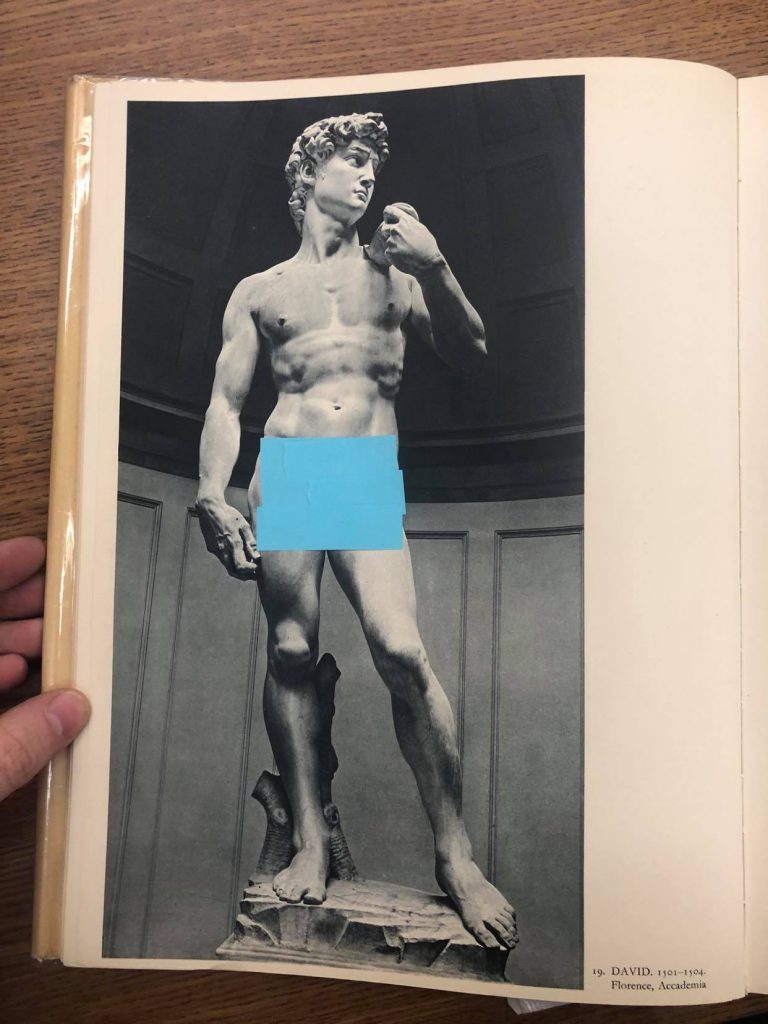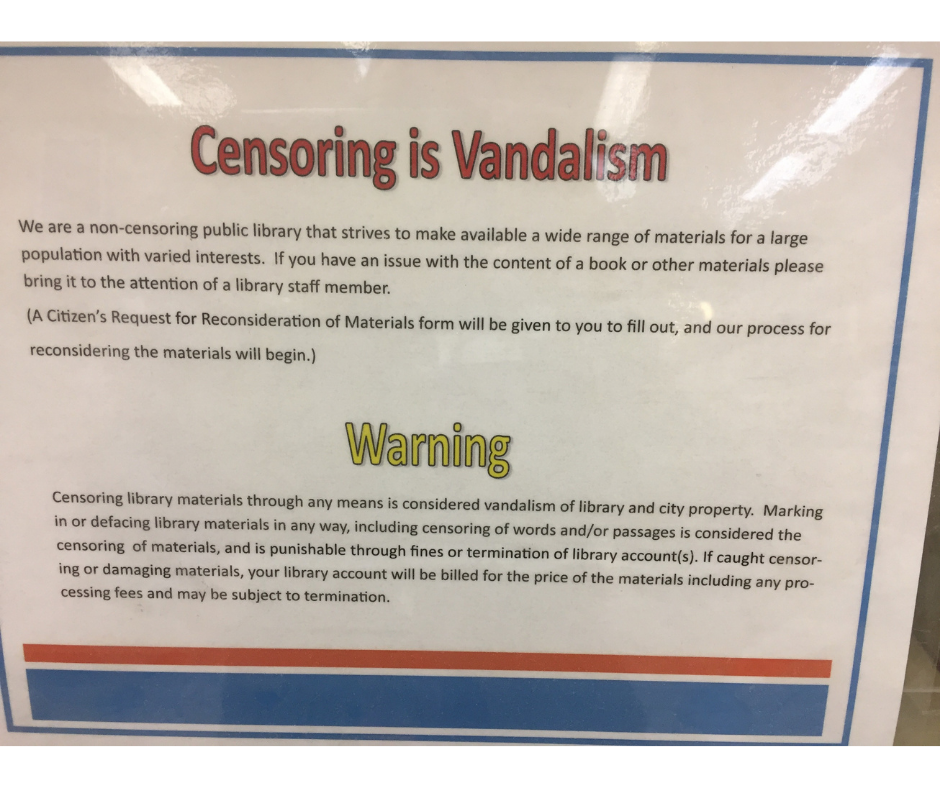Ashley Taylor, Tyler Public Library’s head librarian, says 13 years there has inured her to almost every circumstance.
Still, she might have been a bit surprised the time an employee brought her a book about the restoration of the famous David statue, sculpted by Italian artist Michelangelo.

A patron had checked the book out and returned it with stickers covering the statue’s genitalia, apparently to hide what they felt others did not need to see.
The specter of censorship haunts libraries everywhere and the Tyler Public Library has not been immune, but Taylor said problems with patrons taking censorship into their own hands is not commonplace.
The library staff was never able to find out who placed the stickers on the David’s features but fortunately, they could be removed without defacing the book.
A few other incidents have not been as benign. One book containing words a borrower did not like were crossed out with a Sharpie, permanently damaging the book.
“In that instance, we were able to determine who had done it, and we called the person in and explained that we were going to have to buy a new book. I think she understood the problem.”

Taylor said most of those who object to books complain directly to the library staff. When they do, they are told about the library’s system for reviewing the content of the book.
“We can’t read all the books in the library from beginning to end,” she said. “We have a general sense of what the book is about. It could be that a patron will point out some material that is on one or two pages of a book that we hadn’t seen.”
Most complaints revolve around language — profanity — or sexual content.
Neither of those play a part of the staff’s decision on whether to include a book for circulation.
“We look at the quality of a book. We read the reviews and determine its interest to the people of Smith Co. We include almost all the books on the bestseller lists,” Taylor said.
The library staff will also include more obscure books if they focus on Smith Co. or have other local interest.
“What we see is that usually people just want to talk to somebody to express their complaint. They want someone to hear what they are saying.”
For those who wish to go further, the library has a formal process for patrons to use that begins with filling out in writing a request for the library to reconsider use of the material.
The library’s Collection Development Committee will then consider the request and the patron will be notified of the decision within 30 days. During that time the material will remain on the shelves and not be restricted in any way.
Taylor said the public’s concern can often be alleviated by simply changing where the book is shelved.
“Some of the series for teens may start out with no problems. Then as the books go on, they change a bit. It could be that just moving it to the adult shelves will solve the problem. In some cases, self-censoring might be suggested.”
Taylor said in her time at the library there have only been a handful of complaints about books that have made it as far as the committee for consideration.

The library leaves no questions about the seriousness of patrons who might want to take censoring into their own hands.
A prominently placed sign at the library tells all who enter that “Censoring is vandalism.”
“Marking in or defacing library materials in any way including censoring of words and/or passages is considered the censoring of materials and is punishable through fines or termination of library account(s).
If caught censoring or damaging materials, your library account will be billed for the for the price of the materials, including any processing fees and may be subject to termination,” the sign says.
As with most libraries, the Tyler Public Library loans more than books. Most popular movies can also be found among the shelves in DVD form. While there are no instances of patrons attempting to censor the movies, Taylor said the public sometimes does complain about the content.
She remembers one particular complaint about the HBO television series, “Game of Thrones.”
The series depicts sex acts, graphic violence and nudity along with harsh language, but the complaint was not about any of that.
“It was a man who complained. He said the show would ‘give women ideas.’ We all had a pretty good laugh about that.”
Most challenged books in 2019

The following books are cited by the American Library Association but are based on nationwide complaints, not by the Tyler Public Library.
There are few formal complaints about books at the local library, officials say, though there is a formal process for doing so with forms available both online and at the library itself.
George by Alex Gino
Reasons: challenged, banned, restricted, and hidden to avoid controversy; for LGBTQIA+ content and a transgender character; because schools and libraries should not “put books in a child’s hand that require discussion”; for sexual references; and for conflicting with a religious viewpoint and “traditional family structure”
Beyond Magenta: Transgender Teens Speak Out by Susan Kuklin
Reasons: challenged for LGBTQIA+ content, for “its effect on any young people who would read it,” and for concerns that it was sexually explicit and biased
A Day in the Life of Marlon Bundo by Jill Twiss, illustrated by EG Keller
Reasons: Challenged and vandalized for LGBTQIA+ content and political viewpoints, for concerns that it is “designed to pollute the morals of its readers,” and for not including a content warning
Sex is a Funny Word by Cory Silverberg, illustrated by Fiona Smyth
Reasons: Challenged, banned, and relocated for LGBTQIA+ content; for discussing gender identity and sex education; and for concerns that the title and illustrations were “inappropriate”
Prince & Knight by Daniel Haack, illustrated by Stevie Lewis
Reasons: Challenged and restricted for featuring a gay marriage and LGBTQIA+ content; for being “a deliberate attempt to indoctrinate young children” with the potential to cause confusion, curiosity, and gender dysphoria; and for conflicting with a religious viewpoint
I Am Jazz by Jessica Herthel and Jazz Jennings, illustrated by Shelagh McNicholas
Reasons: Challenged and relocated for LGBTQIA+ content, for a transgender character, and for confronting a topic that is “sensitive, controversial, and politically charged”
The Handmaid’s Tale by Margaret Atwood
Reasons: Banned and challenged for profanity and for “vulgarity and sexual overtones”
Drama written and illustrated by Raina Telgemeier
Reasons: Challenged for LGBTQIA+ content and for concerns that it goes against “family values/morals”
Harry Potter series by J. K. Rowling
Reasons: Banned and forbidden from discussion for referring to magic and witchcraft, for containing actual curses and spells, and for characters that use “nefarious means” to attain goals
And Tango Makes Three by Peter Parnell and Justin Richardson illustrated by Henry Cole
Reason: Challenged and relocated for LGBTQIA+ content
Freedom to read
The Tyler Public Library has adopted the American Library Association’s “freedom to Read” statement, which affirms that, “There is no place in our society for efforts to coerce the taste of others.”
This policy is on both the ALA website and the Tyler Public Library webpage.
• It is in the public interest for publishers and librarians to make available the widest diversity of views and expressions, including those that are unorthodox, unpopular, or considered dangerous by the majority.
• Publishers, librarians, and booksellers do not need to endorse every idea or presentation they make available. It would conflict with the public interest for them to establish their own political, moral, or aesthetic views as a standard for determining what should be published or circulated.
• It is contrary to the public interest for publishers or librarians to bar access to writings on the basis of the personal history or political affiliations of the author.
• There is no place in our society for efforts to coerce the taste of others, to confine adults to the reading matter deemed suitable for adolescents, or to inhibit the efforts of writers to achieve artistic expression.
• It is not in the public interest to force a reader to accept the prejudgment of a label characterizing any expression or its author as subversive or dangerous.
• It is the responsibility of publishers and librarians, as guardians of the people’s freedom to read, to contest encroachments upon that freedom by individuals or groups seeking to impose their own standards or tastes upon the community at large; and by the government whenever it seeks to reduce or deny public access to public information.
• It is the responsibility of publishers and librarians to give full meaning to the freedom to read by providing books that enrich the quality and diversity of thought and expression. By the exercise of this affirmative responsibility, they can demonstrate that the answer to a “bad” book is a good one, the answer to a “bad” idea is a good one.
Phil Latham has been an East Texas journalist for more than 45 years as a reporter, editor, publisher and editorial page editor. He writes a weekly column available at https://platham56.wixsite.com/website. He has also written two novels. Readers can contact Phil at [email protected]. He lives in Smith County with his wife and three pups.
Love what you're seeing in our posts? Help power our local, nonprofit journalism platform — from in-depth reads, to freelance training, to COVID Stories videos, to intimate portraits of East Texans through storytelling.
Our readers have told us they want to better understand this place we all call home, from Tyler's north-south divide to our city's changing demographics. What systemic issues need attention? What are are greatest concerns and hopes? What matters most to Tylerites and East Texans?
Help us create more informed, more connected, more engaged Tyler. Help us continue providing no paywall, free access posts. Become a member today. Your $15/month contribution drives our work.







